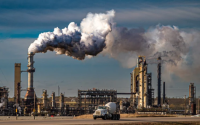The flaw means existing predictions for temperature rises are inaccurate and will have to be revised upwards by as much as 2C, suggesting the world could experience a hike of up to 7.7C by the end of the 21st Century.
British efforts to combat climate change have focused on preventing carbon dioxide levels rising above 450 parts per million, equivalent to a rise of 2C. If the world warms by more than this, many climate experts believe fragile ecosystems will be pushed beyond their "tipping point", triggering runaway global warming.
The flaw came to light during a study of the effects of global surface temperatures on atmospheric carbon dioxide levels. Scientists have long known that greenhouse gases raise temperatures by insulating the planet. But a less well known mechanism is that the warmer the planet gets, the more carbon dioxide is released naturally by soil and oceans. The result is a mechanism where atmospheric carbon dioxide creates warming that causes even more carbon dioxide to be released.
Peter Cox, scientific director for climate change at the Centre for Ecology and Hydrology in Dorset, with researchers from the US and the Netherlands, used ice cores from the Antarctic to study carbon dioxide levels trapped during a period called the Little Ice Age, from 1550 to 1850. They found carbon dioxide increased rapidly with warming, as soils decomposed faster and oceans lost more of the gas.
Because scientists have been unable to quantify the effect before, it has not been included in many climate models. But when it is taken into account, it lead to carbon dioxide levels that boosted temperatures by between 15 and 78%.
A recent report by the Intergovernmental Committee on Climate Change found that carbon dioxide levels were likely to double pre-industrial levels by 2050. The latest research pushes those estimates to between 1.6C and 6C, Geophysical Research Letters reports.
Lead author Margaret Torn, of the Lawrence Berkeley National Lab, said: "To predict the future you have to guess how much carbon dioxide levels will go up. That depends on the biggest uncertainty of all, what humans do."






